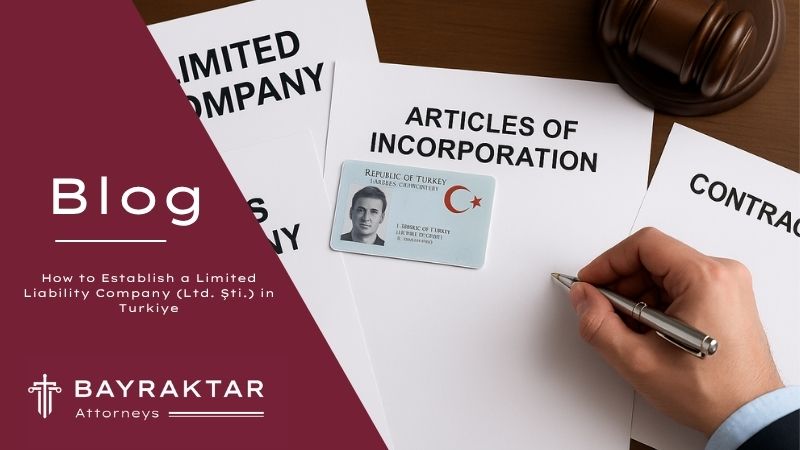
Limited liability companies in Türkiye are formed when one or more shareholders, or their legal representatives, submit the necessary documents to the Trade Registry Office. The process is mainly governed by the Turkish Commercial Code and the Trade Registry Regulation.
This guide explains the legal definition of a limited company, outlines the requirements for its formation, and answers frequently asked questions based on the 2025 procedures.
What Is a Limited Liability Company?
A limited liability company (in Turkish, “Limited Şirket” or “Ltd. Şti.”) is a commercial entity established for profit by one or more shareholders, registered before the Trade Registry Directorate.
Under the Turkish Commercial Code, shareholders are not personally liable for the company’s debts. Their liability is limited to the capital they have committed to and any additional obligations outlined in the articles of association.
In addition to cash contributions, tangible and transferable assets such as real estate, equipment, or vehicles may be used as capital.
This company form is similar to:
LLC (USA)
GmbH (Germany)
Ltd. (UK)
SARL (France)
S.L. or S.R.L. (Spain and Latin America)
Srl (Italy)
Requirements to Establish a Limited Company
To establish a limited company in Türkiye, the following conditions must be met:
1. Company Name (Trade Name)
The chosen company name must:
Include at least one of the company’s activities
Be distinguishable from other registered names
Avoid misleading the public
Not conflict with public morals or order
You should conduct a trade name search before proceeding.
2. Business Scope
A limited company can be set up for any legal and economic purpose. Activities that are illegal or not related to business are not allowed. In some industries, the company’s purpose must be clearly stated in its articles of association. For example, if the company will operate in health tourism, the term "health tourism" must be specifically included.
In certain regulated fields, companies are only allowed to engage in one line of business.
3. Shareholders
A limited company must have between 1 and 50 shareholders. These may be individuals or legal entities (e.g., another company). However, legal entities must appoint an individual representative for the company.
Minors may also become shareholders. If a minor is represented by only one parent, court appointment of a guardian is required to sign the articles of association on their behalf.
4. Minimum Capital
The minimum capital requirement is 50,000 TL. Each share must be worth at least 25 TL and can be freely allocated among shareholders. While the capital does not need to be paid upfront, it must be fully paid within 24 months. This is a notable advantage over joint stock companies, which require 25% of the capital to be paid before registration.
Step-by-Step: How to Establish a Limited Company
Step 1: Pre-Formation Procedures
Foreign nationals must:
Translate their passport into Turkish
Grant a power of attorney (PoA)
This PoA must be issued by a notary in Türkiye, a Turkish consulate abroad, or a notary in an apostille-signatory country. The PoA must be translated into Turkish and apostilled if issued abroad.
Foreign founders must also obtain a Turkish tax ID number.
Step 2: Founder Registration at the Trade Registry
Before drafting the articles of association, foreign shareholders must be registered at the relevant Trade Registry Directorate. This speeds up the process later. Registration requires:
Passport translation
PoA
Tax ID certificate
Step 3: Drafting the Articles of Association
This document is the company’s legal backbone, outlining:
Purpose and business activities
Shareholders’ rights and responsibilities
Governance and capital structure
Registered address
Because it governs all corporate activity, it is strongly advised to draft this with legal counsel.
Step 4: Reserving the Company Name
The company’s name must be reserved through Türkiye’s Central Registry System (MERSIS). A short reservation window is provided, after which the name becomes publicly available again.
Step 5: Final Submission and Registration
Once the articles are finalized, the founders or their attorneys must:
Schedule an appointment with the Trade Registry
Prepare and submit all necessary documentation
Appear in person to sign documents
Pay required fees (amounts depend on the company’s capital)
After approval, the company is officially registered and announced in the Turkish Trade Registry Gazette.
Post-Formation Procedures
1. Issuing Signature Circulars
The legal representatives (managers) must obtain notarized signature circulars. Foreign nationals must do this in person with a sworn translator. Without this document, the company cannot legally operate.
2. Tax Office Registration
After formation, the Tax Office will perform an on-site inspection (known as “yoklama”) to confirm the company’s address. If this step fails, the company may be deregistered.
To avoid costly mistakes or rejections, legal representation during the company formation process is highly recommended.
FAQs
How many people are needed to start a limited company?
At least one, up to a maximum of 50 shareholders.
Can two people start a limited company in Türkiye?
Yes, two-person companies are common and legally permitted.
Can a company be formed 100% online in Türkiye?
No. While many steps can be completed remotely, certain legal procedures (like notarization or PoA issuance) require in-person action or physical presence at Turkish consulates abroad. So full remote formation without any third-party assistance is not technically possible.
Also Read; Understanding Turkish bankruptcy law
Conclusion
Limited companies are a highly flexible and cost-efficient legal structure in Türkiye. Their advantages include:
No need for upfront capital payment
No obligation to hire an attorney (unlike joint stock companies)
Simpler management and governance
No mandatory external audit
Since the articles of association act as the company’s foundation, they must be carefully prepared to match the business’s purpose. Working with an experienced attorney helps ensure that your company is set up properly, in line with the law, and without delays.
This also helps prevent legal or administrative problems in the future. So you can reach us for our company establishement services today.
Recently Added Blogs



.png)
.png)
.png)
.png)
